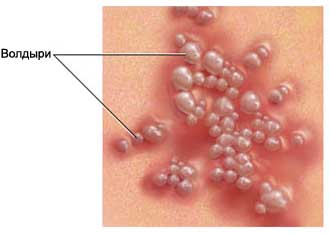Blisters – Bubbles
Description blisters
Blister – a fluid-filled bump on the skin.

Causes of blisters
Causes of blisters include:
- Friction or constant pressure – Wearing tight shoes or retention tool;
- Second-degree burns, including sunburn;
- Viral infections, such as chickenpox or shingles;
- Fungal infections, eg mycosis;
- Contact dermatitis;
- Allergic reactions, effects of drugs, certain types of cancer and inflammatory diseases;
- Severe swelling of the skin, especially on the legs.
Risk factors for blisters
Factors, which increase the likelihood of blisters:
- Wearing improper shoes;
- Working hand tools;
- Prolonged exposure to the sun.
Symptoms of blisters
Symptoms may include:
- Fluid-filled bumps on the skin, which often have a rounded shape;
- Fluid, usually, transparent, but may be bloody.
Diagnosis blisters
You can diagnose the presence of a blister on appearance. Consult your doctor, If a painful blister, infected, or is associated with severe burns.
Treatment of blisters
Blisters often heal without further treatment. Some general tips for speedy healing:
Protect the affected area
- Be careful with the injured area. To prevent further damage, on the affected area you want to put a bandage. The blister should begin to shrink in about seven days;
- Do not squeeze or puncture the blister. Open the blister increases the chance of infection and delays healing;
- In the case of a blister from an allergic contact dermatitis, or viral infections, Do not scrub it or scratch oneself. If necessary, you need to see a doctor for prescribing to relieve the itching and discomfort.
Support the affected area clean
If the blister is closed, wash it with soap and water and apply a protective bandage. If the blister is open, wash it, Apply antibiotic ointment, and then apply a sterile dressing or bandage.
Consult your doctor
A blister usually heals by itself. Consult a doctor in the following cases:
- The blister is unusually large (t. it is. better, than a large coin);
- The blister is in the critical region, eg, on the face or in the groin;
- The blister appeared after the burn;
- There are signs of infection, such as strong redness around the bubble, red stripes, severe swelling, pyorrhea, fever or increased pain.
Preventing blisters
To prevent blisters:
- Wear comfortable shoes;
- Always wear socks with shoes;
- Use gloves when working with hand tools;
- Wear a hat, protective clothing and use a sunscreen during sun exposure.
